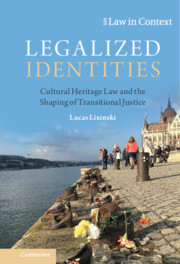Book contents
- Legalized Identities
- The Law in Context Series
- Legalized Identities
- Copyright page
- Dedication
- Epigraph
- Contents
- Acknowledgments
- Cases
- Instruments and Legislation
- 1 Introduction
- 2 Identity, Memory, and Transitional Justice
- 3 Conservation and Reinvention
- 4 Erasing or Replacing Symbols
- 5 Creating New Symbols
- 6 Cultural Heritage As Pragmatism
- 7 Conclusions
- References
- Index
2 - Identity, Memory, and Transitional Justice
Published online by Cambridge University Press: 14 May 2021
- Legalized Identities
- The Law in Context Series
- Legalized Identities
- Copyright page
- Dedication
- Epigraph
- Contents
- Acknowledgments
- Cases
- Instruments and Legislation
- 1 Introduction
- 2 Identity, Memory, and Transitional Justice
- 3 Conservation and Reinvention
- 4 Erasing or Replacing Symbols
- 5 Creating New Symbols
- 6 Cultural Heritage As Pragmatism
- 7 Conclusions
- References
- Index
Summary
This chapter undertakes a systematic review of the literature on memory and transitional justice to provide support for the central premise of the book: that law and memory studies miss each other in transitional justice. In doing so, this thick description of the literature provides the key background for the case studies in other chapters. Further, the chapter examines the regime for the protection of cultural heritage in wartime of the 1954 Hague Convention and its Protocols as a paradigmatic case study of cultural heritage law’s reluctance to engage with transitional efforts. The chapter’s engagement with the idea of anti-anti-politics in the context of the conservation paradigm or the Authorized Heritage Discourse also aligns the book with critical work on the anti-impunity move in the international human rights movement.
Keywords
- Type
- Chapter
- Information
- Legalized IdentitiesCultural Heritage Law and the Shaping of Transitional Justice, pp. 16 - 54Publisher: Cambridge University PressPrint publication year: 2021



